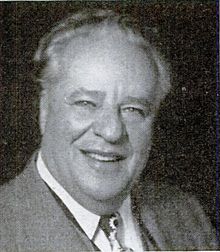Frank W. Boykin
| Frank W. Boykin | |
|---|---|

From 1953's Pocket Congressional Directory of the 83rd Congress.
|
|
| Member of the U.S. House of Representatives from Alabama's 1st district |
|
|
In office July 30, 1935 – January 3, 1963 |
|
| Preceded by | John McDuffie |
| Succeeded by | Jack Edwards |
| Personal details | |
| Born |
February 21, 1885 Bladon Springs, Alabama |
| Died | March 12, 1969 (aged 84) Washington, D.C. |
| Political party | Democratic |
Frank William Boykin, Sr. (February 21, 1885 – March 12, 1969) served as a Democratic Congressman in Alabama's 1st congressional district from 1935-1963.
Born in Bladon Springs, Alabama, Boykin had little formal education, but through hard work and perseverance, became a successful businessman with interests in lumber and turpentine. During World War I, he was an executive with several shipbuilding companies. He was one of the more prominent defendants in Mobile's whiskey trials of 1924 and 1925.
In 1935, he was elected to Congress from the Mobile-based 1st District following Congressman John McDuffie's appointment to a federal judgeship. Since he hadn't voted in any election since the 1920s, he had to pay 14 years' worth of back poll taxes to be able to cast a vote for himself. He won the seat again in 1936 and was reelected an impressive 12 more times. He was chairman of the House Patents Committee from 1943 to 1947. He ran in a special election for the United States Senate in 1946, but finished a distant third.
Boykin was considered a congressman whose mission was to take care of his district's citizens. Although his seniority allowed him to steer millions of federal dollars to his district, he was known for missing roll call votes more often than any other member of the state's congressional delegation.
Although Boykin supported racial segregation (as did most Alabama politicians of the time), he had a reputation for helping black constituents even if they couldn't vote. He had a particularly warm relationship with Alex Herman, the father of Bill Clinton's Secretary of Labor, Alexis Herman. For example, he encouraged Herman to deliver black votes in the Mobile area to Senator Lister Hill during Hill's contentious 1962 election. It is believed that Hill's 6,000-vote margin of victory in that election was due mostly to heavy black turnout in Mobile.
...
Wikipedia
